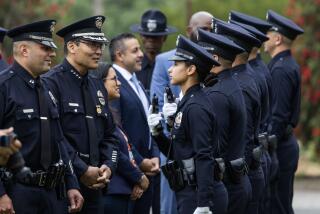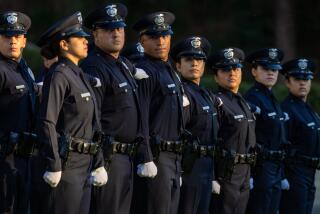Border Town’s Police Short on Training, Weapons
- Share via
AN NUKHAYB, Iraq — Abdullah Hammad, 18, is ready to join the Iraqi police force and help provide order in this tumbledown town near the border with Saudi Arabia.
For that, he has the appreciation of the U.S. military, eager to turn over the job to Iraqi security forces it is in the midst of training.
But Hammad, a shepherd, would like the Americans to supply him with a lightweight semiautomatic Glock handgun, the type they are giving Iraqi graduates of police academies. Hammad, like three-quarters of the officers here, has received little or no formal training in police work.
No academy, no Glock, Marine 1st Sgt. Jeff Sesak told Hammad and two dozen other officers gathered in an abandoned classroom last week for a briefing on checkpoint and vehicle-stop procedures in the run-up to the national election set for Jan. 30.
The disappointment was palpable.
Iraqi police are concerned about their own safety as well as that of the public, in light of the hundreds of Iraqi officers and other security personnel who have been killed fighting insurgents and in suicide bombings and kidnappings.
The Americans don’t want weapons to fall into the wrong hands or to be misused by police who haven’t taken a required eight-week training course.
“If we give them the Glocks,” Sesak said later, “there’s no incentive for them to get training.”
The Glock issue is one of many facing the U.S. as it attempts to recruit, train and equip the Iraqi security forces.
There are also problems with communications, vehicle maintenance and the Baghdad government’s tendency to be late with paychecks. Police in An Nukhayb have not been paid since November.
Seeking to avoid being attacked by insurgents, many policemen are reluctant to wear armbands that identify them as law enforcement officers. And many prefer not to be seen in the presence of U.S. military personnel.
Yet the police here are being given responsibility for guarding polling places and preventing infiltrations by insurgents, with U.S. Marines and soldiers remaining a short distance away, ready to respond to emergencies.
To assess the readiness of the police here and across restive Al Anbar province, which includes both the heavily populated Sunni Triangle area and vast expanses of lightly populated desert, the Marine Corps has dispatched a team of active-duty officers and reservists, backed by law enforcement veterans hired by the Pentagon.
A similar review of the Iraqi national guard, which will share responsibility for border control, is underway.
An Nukhayb, about 250 miles southwest of Baghdad and 65 miles from the Saudi border, is known as a stopover spot for hajj pilgrims headed for Mecca. Goats and donkeys roam the streets; children, many of them barefoot, chase after Marine vehicles, asking for candy, soccer balls and pencils.
The Camp Pendleton-based 2nd Battalion, 11th Marine Regiment, is responsible for security in the region.
The town, home to 5,000 to 15,000 people, has a strong tribal structure. Sheiks from the leading Al Enize tribe have welcomed the Americans.
Nevertheless, Sadiy Chahab, the local police chief, said “We are glad the Americans have been here, but we understand they want to go home.
“We can take it from here: piece of cake, as you say,” he said, speaking through an interpreter.
Sesak, in civilian life a patrol sergeant with the El Dorado County Sheriff’s Department in Northern California, said he was marginally encouraged after talking with the officers in An Nukhayb.
Although the police here talk a good game, Sesak said, he would like to see more organization, more energy and a better understanding of outreach, communication and preventive police work.
The department has 58 officers, 13 of whom have attended an academy. They are armed with several dozen AK-47s and have seven vehicles, four of which are in running order, and a cellphone.
“I would put them slightly above average from what we’ve seen in Al Anbar province,” Sesak said.
There have been no recent reports of insurgents passing through An Nukhayb, the Marines said. The main criminal problem is carjackings, with thieves flagging down long-haul truckers and stealing their vehicle and cargo.
There are procedures for investigating traffic accidents. There is the beginning of a record keeping system.
But, at a meeting last week involving the Marines, the police chief and his officers, the idea of patrolling the city and asking residents about their concerns appeared to be a new concept to the Iraqis.
“As police you want to be courteous and want to be friendly,” Sesak told them during his hourlong lecture.
The rampant criminality in several large Iraqi cities has not spread to An Nukhayb, where, as the chief pointed out, “everybody knows everybody,” and tribal sheiks have their own methods for punishing miscreants.
Marine Capt. Scott Weis has worked hard to establish ties with the sheiks, the police chief and other tribal leaders.
The city is overwhelmingly Sunni Muslim, but Weis has detected no vestige of pro-Saddam Hussein sentiments.
Despite its obscurity, An Nukhayb could prove a pathway for insurgents if left untended.
“This could be the perfect sleepy border town for insurgents to come through to get to the highway” to the rest of Iraq, said Sgt. Robert Dewhurst, a reservist and New York police detective. “That’s why we want the police to stand up here.”
An Nukhayb’s police officers know what it takes.
“I know it is dangerous,” said Ahmad Mhaisen, 28, who has worked at a fruit and vegetable stand. “We want to save our country, but we need guns.”
More to Read
Sign up for Essential California
The most important California stories and recommendations in your inbox every morning.
You may occasionally receive promotional content from the Los Angeles Times.













